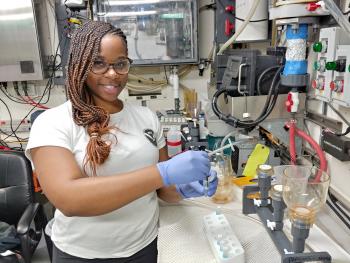Jeanette Davis

NOAA Heritage Oral History Project
NOAA Heritage Oral History Project aims to document the history and legacy of NOAA through compelling interviews with its leaders. These firsthand accounts provide an invaluable resource that preserves NOAA's significant contributions to environmental research and management, fostering a deeper understanding of NOAA's vital role in shaping our understanding of the Earth's oceans and atmosphere.
Molly Graham
Dr. Jeanette Davis is a Marine Microbiologist who currently serves at NOAA Fisheries in the Office of Policy where she conducts research and provides support on programs and policies regarding resources in the ocean. Dr. Davis was first exposed to the marine environment as a student at Hampton University during an internship where she lived on a 53-foot sailboat for a month, exploring the Chesapeake Bay. She earned a B.S. in Marine and Environmental Science from Hampton University and a PhD. in Marine Microbiology from the University of Maryland, College Park. During her PhD. she studied bacteria association with tropical sea slugs that harbor medicinal compounds. Dr. Davis is recently cited in Science Magazine where she ultimately helped discover a bacterium associated with a Hawaiian sea slug that produces an anticancer compound.
Currently Dr. Davis contributes to ocean science nationally and internationally. She recently worked with notable scientists to author a national publication released from the White House that highlights essential ocean research and technology topics for the next decade. She serves as the US representative for two intergovernmental advisory panels where she travels to various countries to promote, coordinate, and form scientific synergies between various countries and governments. Dr. Davis has traveled to over a dozen countries to discuss ocean science and has been featured in several prominent magazines such as Ebony, Essence, and Black Enterprise as the “next great marine biologist”.
Outside of her professional career, Dr. Davis is a strong advocate of community and has mentored countless students from elementary to college, lectured at several colleges, and founded the Marquis Pressey Scholarship which has awarded two African American males in her hometown of Wilmington, DE.
Dr. Davis attributes much of her success as a scientist to a strong foundation that she received in the Marine Science Department at Hampton University where she currently serves as an Adjunct Professor. Dr. Davis lectures and holds membership on several graduate advisory committees through the Department and understands the importance of empowering young people through science.
Scope and Content Note
Jeanette Davis provides insights into her scientific journey, her contributions to marine science and policy, and her efforts to make science more accessible and inclusive. Her work demonstrates the intersection of scientific research, policy development, and public engagement in the context of marine science and conservation.
Dr. Davis first talks about her childhood and early interests in science, including her fascination with the ocean and marine life. She shares her educational journey, obtaining a bachelor's degree in biology and chemistry and a master's degree in forensic science. She also discusses her decision to pursue a Ph.D. in marine science, focusing on environmental DNA (eDNA) research and genetic analysis of marine organisms and its applications in studying marine ecosystems. She emphasizes the importance of interdisciplinary collaboration and the challenges she faced during her research.
Dr. Davis goes on to describe her role as a Knauss Marine Policy Fellow, where she worked on ocean science and technology policy, particularly related to National Ocean Policy. She also highlights her involvement in the development of the National Protected Species Toolbox and her work on the "National Bycatch Report."
At the time of this recording Dr. Davis was serving as the NOAA invasive species coordinator, working on issues related to invasive species prevention and management. Davis also supports the chief scientist and assists with the implementation of Omics science initiatives. Additionally, she discusses her upcoming children's science book titled "Science is Everywhere," which aims to connect young readers to science and promote diversity in scientific representation.
Please Note: The oral histories in this collection are protected by copyright and have been created for educational, research and personal use as described by the Fair Use Doctrine in the U.S. Copyright law. Please reach out Voices@noaa.gov to let us know how these interviews are being used in your research, project, exhibit, etc. The Voices staff can help provide other useful resources related to your inquiry.
The NOAA mission is to understand and predict changes in climate, weather, oceans, and coasts, to share that knowledge and information with others, and to conserve and manage coastal and marine ecosystems and resources. The Voices Oral History Archives offers public access to a wide range of accounts, including historical materials that are products of their particular times, and may contain offensive language or negative stereotypes.
Voices Oral History Archives does not verify the accuracy of materials submitted to us. The opinions expressed in the interviews are those of the interviewee only. The interviews here have been made available to the public only after the interviewer has confirmed that they have obtained consent.
